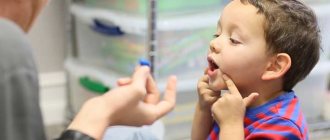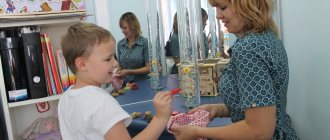Every mother watches her children with interest and looks forward to their first words. But sometimes they do not appear for a long time, or speech is filled with individual sounds. Some parents notice that children pronounce words incorrectly or distort them, but do not know when their child needs a speech therapist and for what problems.
Often, mothers and fathers turn to a specialist only when the child is left for the second year at school or is forced to leave the kindergarten/school due to a developmental delay, the basis of which is speech. We'll tell you when to contact a speech therapist with your child to avoid problems in the future.
Classes with a children's speech therapist-defectologist
CENTER FOR CHILDREN'S CORRECTIONAL DEVELOPMENT AND NEUROPSYCHOLOGY on Mozhaisk sh. 4k1, conducts speech therapy diagnostics, speech therapy correction for children with
- ZPR, ZPRR, ZRR,
- ASD, HIA, FFDD, ADHD, cerebral palsy,
- Down syndrome, alalia, dyslalia,
- phobias and panic attacks,
- as well as for non-speaking children, speech pathologists, and the hearing impaired.
Correctional classes for children are conducted by experienced children's speech therapists and speech pathologists. The lesson includes exercises for the development of the affected components of speech and other mental functions of the child, including the production of sounds, the development of perception and hearing, the correction of lexical and grammatical violations, the formation of motor functions and articulatory motor skills. The duration of one lesson is 45-60 minutes, but the lesson can be increased by 5-10 minutes, depending on the individual characteristics of the child.
Why have thousands of patients already chosen us?
Comprehensive treatment and improvement of communication skills
Speech therapists for children and adults are not limited to just correcting speech disorders. Correctional classes increase the mobility of the articulatory apparatus, develop phonetic hearing and various types of thinking, correct visual perception, improve auditory attention and memory.
Correcting emotional behavior, along with correcting speech disorders, allows a person to overcome shyness, develop public speaking skills, and teach correct behavior in conflict situations.
Psychological help
As a rule, patients, even with ordinary speech impairment, have serious psychological problems. What can we say about people who have lost the ability to speak normally as a result of accidents, illnesses or complex psychological traumas. All speech therapists practicing in Preambula clinics have undergone special training and use certain psychological techniques in their classes.
Seek the services of speech therapists for children and adults
If your child or loved ones need the services of a speech therapist, do not delay visiting a specialist. Many of the successful people around us could have been notorious losers if their parents had not raised the alarm in time and taken them to a speech therapist.
Call us, we are waiting for you!
Admission fee:
| 10673 Speech therapy diagnostics | 1600 |
| 10797 Speech therapy classes using articulation massage and neuropsychological correction techniques | 2000 |
| 15277 Speech therapy session with neuropsychological correction | 2000 |
| 10797 Speech therapy classes using articulation massage and neuropsychological correction techniques | 2000 |
| 4284 Speech therapy correctional lesson | 1500 |
How to reduce the cost?
When should you contact a speech pathologist?
Speech therapy classes are conducted with children aged 10 months and older when the first signs of the following speech disorders appear:
- 10 months - 1.5 years (when the child’s “vocabulary” is actively replenished): “new words” do not appear in the child’s vocabulary for a long time;
- from 2 to 3 years (a period of very rapid development of speech): the child uses few parts of speech and does not pronounce the simplest sentences;
- from 3 years old: the child did not speak.
If after 5 years the child:
- the child stutters;
- pronounces some sounds incorrectly; rearranges syllables in words;
- constructs phrases grammatically incorrectly (omits all prepositions, confuses cases, plural/singular, gender of parts of speech);
- experiences great difficulty in logically and consistently conveying the meaning of a statement;
- has unclear speech: words are blurred, the effect of “porridge in the mouth.”
Signs of normal speech development
The first reaction of a newborn baby is to cry. Afterwards it transforms into humming - the production of individual sounds. By six months, the baby is already babbling with might and main, that is, pronouncing similar syllables. He can already use them to express his demands and desires.
- The first stage of active speech begins at one year of age. By this time, the baby begins to pronounce individual words and connect them into simple sentences. The vocabulary increases; by the age of one and a half years, children begin to form phrases of four words.
- At 2-3 years old, the baby is already actively communicating with peers. His speech is far from ideal, he swallows parts of words and does not pronounce half of the sounds, but is able to remember simple poetry.
- At three years old, whistling sounds [С], [С'], [З], [З'], [Ц] appear, but they are not always pronounced clearly - this is normal.
- At the age of four, the hissing sounds [ZH], [SH], [CH'], [SH'] appear; children easily formulate their thoughts and conduct full-fledged dialogues with adults, which are limited only by their level of knowledge about the world around them.
- At five or six years old, the most complex sounds appear - sonorous sounds. These include [P], [P'], [L], [L']. Children are mastering speech better and better, and they almost no longer make mistakes. Their vocabulary contains about 2 thousand words.
- By the age of seven, the child pronounces all the sounds of the Russian language and pronounces them correctly. Actively retells stories using pictures, easily changes intonation and uses about 3,500 words in communication.
If your baby develops according to the scenario described above, then the child needs a speech therapist at 2.5 years old. The specialist will diagnose speech development, make sure that the baby is developing normally, and tell you the nuances of the current state of speech, what you should pay attention to.
Why is speech therapy correction important at an early age?
It is very important that any deviations in the child’s speech development are noticed and corrected in a timely manner. Nowadays, almost every child, even one who seems to speak well, ideally requires speech training before school. For example, if you are planning to send your child to a public or private kindergarten, then attending corrective classes with a speech therapist-defectologist will prepare your child for preschool education. The fact is that many speech problems in children are very difficult to detect in everyday life, but they become obvious when the child begins to learn to read and write. In such situations, correction will be required already at school age so that the child does not lag behind his peers in mastering the material.
Or maybe it will go away on its own?
If a child lags behind his peers in some way, this is not a cause for concern. Children develop unevenly: sometimes they accumulate experiences and impressions in order to then make a breakthrough. So one child already speaks in phrases, and the other only in words. One immediately began to clearly “growl”, and the other pronounced words in the French manner. One understands that cucumber and tomato are vegetables, while the other does not know how to generalize the concepts. To assess the level of speech development of children, psychologists and teachers have developed special manuals.
Instead of comparing your child to others, offer tests one to two months apart. If your son or daughter's abilities improve over time, everything is probably fine. If it seems to you that the child is standing still, seek advice. When a child distorts sounds or makes grammatical errors: for example, “grandmother went to the store,” he should be shown to a speech therapist. The sooner a specialist begins to observe a child, the greater the chance of successful speech correction. A speech therapist does not always offer classes; he may refer you for a consultation with a neurologist or neuropsychologist. At Tetrica you will receive your first consultation with a speech therapist for free. Fill out the form and come meet us!
How are classes conducted?
Before the start of a course of classes, a speech pathologist-defectologist conducts a Speech Pediatric Diagnostics of the CHILD, and, upon detection of speech disorders, an individual program of correctional classes is developed.
In our Center, correctional classes with a child are carried out individually in a specially equipped speech therapy room, in a playful way, using exercises to develop the affected components of speech and other mental functions:
- staging and automation of evoked sounds;
- development of phonemic perception and hearing;
- correction of lexical and grammatical violations;
- activation and enrichment of vocabulary;
- correction and formation of motor functions: articulatory motor skills (speech therapy massage, articulatory gymnastics), fine and gross motor skills;
- development of various types of attention and memory, emotional-volitional sphere;
- work on speech prosody: (pitch, strength, timbre of voice, intonation expressiveness).
- as well as massage (probe or manual).
The duration of one lesson is 45-60 minutes, but the lesson can be increased by 5-10 minutes, depending on the individual characteristics of the child. To achieve a certain result, depending on the age of the child, a course of several sessions is required.
Group classes and their effectiveness
Speech therapists believe that working in a group consisting of children with similar speech impairments is often more effective than individual sessions. At the same time, children gain not only speaking, but also social skills. At the same time, group work can be combined with individual lessons - this way we use the advantages of both approaches and get the opportunity to consolidate the results obtained.
Classes are conducted in stages, in accordance with a pre-developed and approved program. At each stage certain tasks are solved.
We recruit children of all ages into speech therapy groups. The specific focus depends on the goal that is set for them. Some groups are intended for a child who does not yet speak, while others consist of preschoolers preparing for school. Teenagers are also invited - speech therapy can help them correct speech disorders.
Does your child need help in eliminating speech development deficiencies? Specialists will provide you with the necessary services. Do not delay your visit to our organization. Modern speech therapy claims that the earlier a child starts classes, the more effective they will be. Our staff is ready to answer your questions at a time convenient for you. Online consultation is possible.
What if we can't come?
On-line (distance) classes with a speech therapist teacher
There are often situations when, during classes with a speech therapist, the family leaves Moscow for some time, but the course of classes cannot be interrupted. In such cases, the CDKRN conducts classes with a speech therapist remotely (on-line).
Before the start of the course of online classes, the teacher-speech therapist conducts both Speech Therapy DIAGNOSTICS of the CHILD and several classes to establish contact with the child, develop a correction program,
If the child does not have the opportunity to come to the Center for diagnosis, then the work process is based on the first online session with the child and parents, after which the degree of speech disorders and deviations becomes generally clear. Taking into account the inevitable limitations of the online communication system, the speech therapist and teacher chooses a lesson program that is possible in the given situation.
Clarification and more targeted work with the child is possible only after a full face-to-face diagnosis of speech disorders at the Children's Children's Center.
In our Center, online correctional classes with the child are conducted individually in a specially equipped speech therapy room, with special equipment for two-way communication.
The client is provided with special materials for preparing the house
During the online session, the material is demonstrated through a video system. The speech therapist teacher and the child work according to work assignments and texts sent and printed by parents in advance.
Working with a child online (remotely) is allowed in the following cases:
- There is a high-quality Internet channel (at least 10 Mb/sec) on the client side;
- Specially sent working material was printed in advance
- Time and place are organized by the client, which allows the session to be held without distractions or interruptions
- Preliminary work has been carried out with the child, including diagnostics.
- Parents have the opportunity to pay for classes through a remote bank using an invoice issued in advance and prepaid in advance.
The duration of one lesson is 45-60 minutes, but the lesson can be increased by 5-10 minutes, depending on the individual characteristics of the child. To achieve a certain result, depending on the age of the child, a course of several sessions is required.
Prices for speech therapist services for children 7 years old
| Types of activities | Cost of 1 lesson/session | Duration of 1 lesson/session | Recommended classes/sessions |
| Diagnostic consultation with a speech therapist | 1000 rub. | 30 min. | 1 lesson |
| Individual speech therapy session | 800/1000 rub. | 45 min. | 10-15 sessions |
| Group speech therapy session | 600 rub. | 45 min. | from 2 times a week |
| Logomassage classic | 800/1000 rub. | 45 min. | individually |
| Logomassage touch | 800/1,000 rub. | 15 minutes. | from 2 times a week |
| Logorhythmics group lesson | 600/800 rub. | 45/60 min | 1 time per week |
| Individual defectology lesson | 1000 rub. | 45 min. | from 2 times a week |
| Referral to a neurologist | for free | — | once a month |
Conducts speech therapy classes for children. Our specialists are true professionals. Classes with a speech therapist for children 7 years old will help the child expand his vocabulary, learn to pronounce sounds correctly and construct sentences. The work uses proven methods that have long proven their effectiveness.
Speech development disorders we work with:
Specialists from the Center for Children's Correctional Development and Neuropsychology have extensive experience in comprehensive research and correction of the following speech disorders in children:
- Alalia
- Dysarthria
- Stuttering, mutism, surdomutism
- Speech disorders associated with defects of the articulatory apparatus (mechanical dyslalia, rhinolalia)
- Dysgraphia
- Dislalia
- Dyslexia
- Dysphonia
- Delayed speech development (SDD)
- Delayed psychospeech development (DSRD)
- General speech underdevelopment (GSD)
- Rhinolalia
- Phonetic-phonemic speech disorder
as well as speech disorders with:
- autism
- cerebral palsy
- Mental retardation (MDD)
- Attention deficit hyperactivity disorder (ADHD)
- Down syndrome
- Mental retardation
Speech therapist for adults
Many adults need the help of a speech therapist. Sometimes they become so accustomed to their incorrect speech that they are not even aware of the speech disorder, learning about it from colleagues or acquaintances. Incorrect speech becomes a barrier to achieving desired goals, preventing negotiations or free communication.
There is an opinion that it is unrealistic to get rid of speech defects in adulthood. The experience of speech therapists from the PreAmbula network proves the opposite. Qualified speech therapists for adults have already helped hundreds of patients cope with stuttering, erased dysarthria, impaired sound pronunciation and other defects. Well-designed sets of special exercises and qualified treatment ensured the correct pronunciation of sounds and formed good diction.
In the correction of speech disorders in adults, the choice of correction technique depends on the root cause of speech problems. For example, after surgery on the larynx, speech therapists use the “esophageal speech” method - in this case, the formation of sounds occurs through the esophagus. If speech impairment is the result of a stroke, correction is based on gradual recovery.
Our speech pathologists-defectologists:
Lebedeva Tatyana Vyacheslavovna
Children's speech pathologist, neurodefectologist, specialist in working with children with developmental disabilities. She graduated with honors from the Moscow Open Social University with a degree in Correctional Pedagogy and Special Psychology (Preschool) and was awarded the qualification of a teacher-psychologist for working with children with developmental disabilities. She is a member of the Interdisciplinary Association of Myofunctional Therapy (IAMT) and is recommended to work as a myofunctional therapist in a pediatric multidisciplinary clinic. She has repeatedly taken part in pedagogical marathons, children’s health days, correctional pedagogy, inclusive education, speech therapists, therapeutic physical education. She leads children with FFDD, mental retardation, mental retardation, severe speech disorders: dysarthria, alalia. She has extensive experience in diagnosing disorders, starting speech, correcting sound pronunciation, correcting reading and writing disorders (dysgraphia, dyslexia), works with ONR on the formation and development of the lexico-grammatical aspect of speech. Experience in practical work with children (correction of disorders) - more than 20 years .. Read more.
Belaya Tatyana Konstantinovna
Teacher-defectologist, teacher of the deaf, early development specialist. He has 27 years of practical experience working with children. He has knowledge and skills both in the field of general pedagogy and psychology, and in the field of special psychopedagogy. Works with all categories of children, including children with disabilities, including children with complex conditions. Treats children with ASD, mental retardation, severe speech disorders, open/closed rhinophony, FFRD, alalia, dyslalia. Extensive experience working with non-speaking children, including deaf and hard of hearing children. As well as children with intellectual disabilities. Knows mime-gestural speech. Read more.
Kharitonova Elena Anatolyevna
Has successful experience (more than 7 years) of working with children from 2 to 8 years old in leading Centers for the development of speech and hearing, speech therapy / defectological correction of children. Works with all categories of children, including children with complex developmental disabilities, Down Syndrome, mental retardation, mental retardation, mental retardation, alalia, children after cochlear implantation, with hearing impairment, severe speech impairment, FFDD, phonemic disorders. Specializes in children with autism spectrum disorder, non-speaking and hard of hearing children, children with intellectual disabilities. Fluent in sign language. Experience in practical work with children (correction of disorders) - more than 7 years. Read more.
Consultation “First meeting with a speech therapist”
Irina Glukhova
Consultation “First meeting with a speech therapist”
Getting to know a speech therapist plays a decisive role in establishing communication and becomes the first step in fruitful cooperation. It is “cooperation”
, because the result depends on the efforts of several parties:
the speech therapist , parents and the child himself.
Unfortunately, most modern children have one or another deviation in speech development. Even if all sounds are pronounced clearly and correctly, other difficulties arise: dyslexia, dysgraphia, limited vocabulary, inability to form sentences correctly. When a child comes to school, hidden problems make themselves felt. Reading the best literature and “conscious parenting”
will not replace timely
consultation with a qualified speech therapist .
The specialist will not only identify speech abnormalities, but will also show parents the direction in which the child needs to develop. Some difficulties can be overcome by practicing at home on your own. Why are some sounds difficult for children? What should parents do? How do you know when you need to see a specialist?
Each baby has its own pace of development, and this depends on many factors. Genetics is important, how the pregnancy proceeded, diseases of the first two to three years of life . Therefore, all norms have soft boundaries. But you still need to keep an eye on them.
If you are able to show your child to a speech therapist , you will thereby influence his future. There will be fewer problems at school, both academically and in the field of psychology. And a teenager’s choice of profession will not be limited by the inability to pronounce certain sounds. Therefore, it makes sense to monitor the baby’s speech development.
Now parents should take care of the child into their own hands and, at least minimally, have an idea of what a speech therapist , what to expect from classes, and what homework to do at home.
At the first consultation, the speech therapist should clarify the condition (depending on age)
:
· Sound pronunciation (there are age standards, for example, it is pointless to wait for the sound [r] at 3 years old; it will appear after about 5 years);
· Articulatory apparatus,
· Phonemic hearing,
·Grammatical structure of speech:
-word formation (table-table,
-inflection (in cases, genders and numbers,
- coherent speech,
· Language analysis and synthesis (for example, place/position of sound in a word)
.
A competent speech therapist , depending on the age of the child, will talk about speech standards and possible developmental difficulties. After the first consultation, the parent must clearly understand what to do with the child.
WHAT PARENTS SHOULD KNOW:
1."Norm"
Like any other, the ability to speak does not come to us right away. Children master different groups of sounds at this age:
- three months - partying;
- six months - babble;
- year - first words ;
- two years - the formation of vowels and consonants, not counting hissing, whistling and sonorants. At this age, some babies begin to master the sounds s, z, zh, sh, shch. Phrasal speech appears in a primitive form. The active vocabulary so far is dominated by names of actions and objects.
By the age of three, a child already knows and pronounces about five hundred words. The first judgments are still simple and monosyllabic.
Children begin to make whistling and hissing sounds between the ages of three and four years. The vocabulary increases to about a thousand words. Phrases become longer and more complex, but irregularities in the formation of connections and word order are possible. Don't worry, sooner or later everything will be fine.
By the age of five, children master the sounds zh, sh, shch, ch. The active vocabulary reaches two thousand words, speech becomes consistent, coherent, the child can clearly express his feelings and thoughts.
By the age of five or six, the child learns to pronounce the four most complex sounds - r, r, l and l. The vocabulary increases to three thousand words, children answer questions, make up stories based on pictures, and retell familiar fairy tales.
By five, or at the latest by six years, a child should learn to correctly pronounce all sounds, syllables and words without errors. At this age, children are able to tell and retell texts they have read or heard.
2. "If sounds are disturbed"
Work time on each sound individually. Approximately 2-3 months are needed to produce and automate sound in speech. (subject to regular classes and the absence of pathologies of the speech apparatus). At the same time, you can take 2-3 sounds and lead them from production to full introduction into speech. (for example, the sounds [s] and [l] can be practiced immediately, and at the same time prepare the basis for the sounds [r] and [w]). Not all speech therapists for various reasons.
the speech therapist notes the child’s successes and difficulties, gives feedback to parents, and gives detailed assignments in a notebook.
Parents can attend the lesson and see what the speech therapist so that they can study well at home. The excuse that the child behaves worse in front of you is baseless. You just need to come to an agreement with the child. Often, it’s true that a child is comfortable studying independently, and this format can prepare well for school. The choice is yours!
Home is a MUST! It is necessary to complete daily homework, otherwise, when attending speech therapy classes 2 times a week, without home reinforcement, the time frame for working on sounds will increase from 2-3 months to 4-5, or even more, depending on the disorder.
If there is no homework, DEMAND IT! With specific explanations of which tasks are aimed at what (it makes no sense to learn difficult poems just so that you can speak better, all tasks must solve specific problems).
3. “Sound pronunciation is impaired, the child confuses my/mine, there are mistakes in endings and other difficulties...”
· It is impossible to practice both sounds and grammatical structure in a 30-minute lesson. a speech therapist a number of tasks home for independent work with systematic explanations.
· It is important to understand what task you are setting for yourself: If this is preparation for school and you have little time, then you should actively get involved in working in tandem with a speech therapist , possibly a speech pathologist . Increase the regularity of visits and “catch up”
peers in order to be ready to study at school according to the regular program.
· If you have several years before school, then you can prepare yourself for a couple of years of systematic work, completing all homework, and, if necessary, involving other specialists.
· If by the age of 7 the child is not ready to study according to the regular program, then now according to the new Federal State Educational Standard (Federal State Educational Standard)
the child is sent to the PMPK (
Psychological-Medical-Pedagogical Commission , where specialists determine the educational route.
4. “The child does not speak. What to do?”
This is one of the most difficult types of violations.
Who is a speechless child? Recently, specialists are increasingly encountering non-speech children, that is, children who lack speech. They have a complex organic disorder, which greatly complicates speech therapy work with them . Who can be called a non-speaking, speechless child? The level of speech that these children have - vocalizations, onomatopoeia and sound complexes, emotional exclamations, even individual vaguely pronounced everyday words - cannot serve for full communication. That "speech"
, which a child has, does not act as
a “regulator of behavior
,” since the development of conditional connections to words is significantly more difficult. The group of speechless children is heterogeneous. It includes children with motor and sensory alalia, various delays in psycho-speech development, including undifferentiated ones, early childhood autism, intellectual disability, cerebral palsy, and hearing impairment. What do these children have in common? Lack of motivation to communicate, inability to navigate the situation, disordered behavior, inflexibility in contacts, increased emotional exhaustion - everything that interferes with the child’s full interaction with the outside world. If there is a commonality of manifestations, the main symptoms differ in the quality of their course and degree of severity.
It is sometimes difficult for parents to decide how much special attention such a child needs. Indeed, sometimes it is difficult to determine the limiting factor in the speech development of a preschooler - either it is inability or simply reluctance to use one’s speech abilities. The participation of a speech therapist in this case is necessary to determine the cause of the child’s silence and determine the stages of qualified assistance to him. A speech therapist will help his parents outline a prognosis on which the social adaptation of a non-speaking preschooler depends. Parents, when working with non-speaking children, are a kind of PARASPECIALISTS who take an active position.
Advice for parents.
It is important for the child to create a positive speech environment, including:
- repeatedly talk through ordinary, daily activities: dressing, washing, eating, bathing, walking, getting ready for bed, going to bed, cleaning the room and toys, cooking. All these processes must necessarily be accompanied by the speech of mom or dad;
- do articulatory gymnastics. This will help prepare the speech apparatus for the upcoming loads. A speech therapist will tell you the necessary exercises ;
- pronounce tongue twisters, phrases, proverbs for various sounds.
Talk to your children as often as possible, listen carefully to their answers to questions. This will not only improve your child’s speech, but will also establish a trusting relationship between you.










